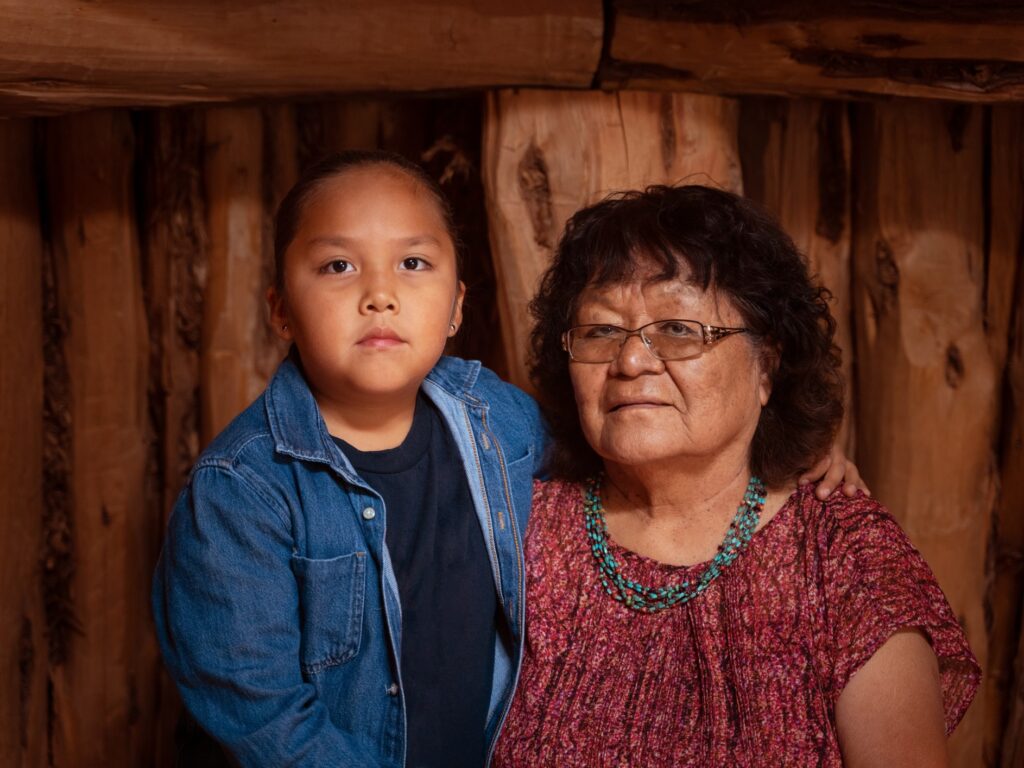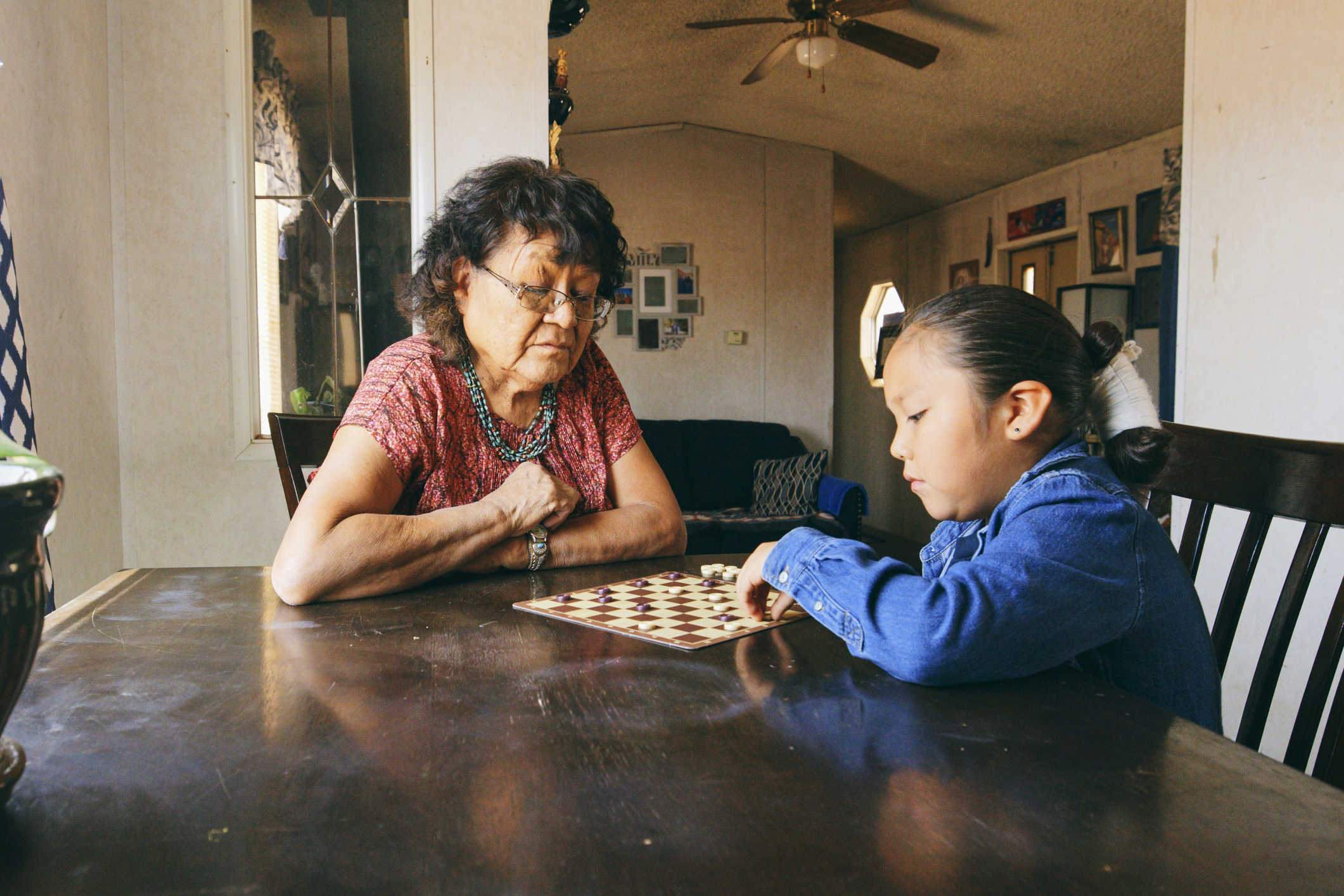Kinship Care Program

About the Navajo Nation Kinship Care Program
Kinship care is a program to help support a child who lives outside of their home with a relative or someone else emotionally close to the child. When children are placed with kin, they are most likely to maintain connections to their family, extended family, traditions, language and history. Kinship parents can be licensed and receive monthly financial support to aid for caring for the child.
Kinship Care FAQ
Who can become a kinship parent?

Just like a foster parent, a kinship parent is a person who acts as a temporary parent and guardian for a child who is not their own biological child and who has lost or been removed from their natural parents’ care.
Becoming a kinship parent requires flexibility, a willingness to grow and learn, and most of all, a commitment to provide a safe, stable, nurturing, and loving home for a child.
Kinship parents can be:
Relationship
- Any adult relative of the child, including grandparents, aunts, uncles, adult siblings, etc.
- Any other adult that is emotionally close to the child, such as a family friend.
Lifestyle
- married or single
- be in any income group
- have children of your own or not
- live in a house, apartment or hogan
- reside on or off the Navajo Nation
- be Navajo or Non-Navajo
What kind of kinship parents is the program looking for?
The program is looking for parents who are:
- supportive of siblings staying together
- open and affirming of LGBTQIA+ children and youth
- aware that kinship care is temporary
- open to care for medically fragile/ medically complex children
- open to caring for children with emotional, behavioral and physical needs
- supportive of parents’ reunification
What is the process?
- Contact any Department of Family Services office/ Foster Care Worker.
- Request a foster care application packet.
- Submit foster care application packet and appropriate documentation to Foster Care Administration. Foster Care Worker will begin to schedule home visits.
- Fingerprint and background checks will be initiated.
- Home visits will be made.
- Home Study will be completed.
- Foster Care Specialist will refer you to various trainings.
- License is completed.
- Licenses are renewed annually.
What are the requirements?
The Paperwork
- Application for Foster Care
- Household Budget Form
- Service Plan
- Authorization for Release of Information
The Training Classes
- Foster Care Regulations “Pre-Placement Training” (10 hours)
- Specialized Training (6 hours)
- 8 Hours of Continuing Education:
- Food Handlers Training (4 hours)
- CPR (4 Hours)
- First Aid (4 hours)
- Parenting Skills (8 hours)
The Tasks
- Placement Agreement
- Foster Home Study completed on whole family in the household
- Child Protective Services/ Child Neglect Clearances
- Criminal History Clearance:
- Federal/Tribal Clearances completed on all adult household members
- Fingerprint clearance completed by DFS Foster Care Administration
- Navajo Nation Criminal/Traffic History (from 18th birthday; fees paid by the applicant)
The Records Collection
- Physical Examination(s) on all adult household members
- Current Immunization Records on all children of the household under 18 years old
- Reference Letters (minimum of three non-relative references)
- Preliminary Environmental Survey (NDCFS):
- House Assessment
- Standards of the Home
- Environmental Health
- Fire Safety
- Car Safety Seat
What else should I know?
Choice
You can choose what type of children you want placed in your home, including their age and gender.
Privacy
Your information is kept private and confidential, and you do not have contact with the birth parents or family.
Licensing
There are two kids of licenses, the regular license and a specialized one, which requires additional training. Some of the children have special needs and may require specialized care, which you can be trained to provide and receive a specialized license.
Cost
Kinship parenting is volunteering, but the Navajo Nation does provide cost-of-care reimbursements to licensed foster parents on a monthly basis for each child placed in the foster home.
Maintenance payments are based on the age and needs of the child or youth.
Additional support can be available including reimbursement for transportation expenses.
What if I’m interested in adoption?
Please follow the link to learn more about the Navajo Indian Child Welfare Act’s Adoption Unit:
What is the Specialized Child Care Permanency Program (SCCPP)?
The Specialized Child Care Permanency Program (SCCPP) provides intensive services to children who have been in out-of-home placement for more than six months. The goal of SCCPP is to finalize permanent living arrangements for children in a safe and stable home when reunification is not the primary case plan goal. Permanent arrangements may include guardianship, adoption, and/or customary adoption.
Referrals:
- SCCPP shall be initiated when a referral/intake is received from the appropriate Case Management Specialist
- The child(ren) being referred are dependent child(ren) and have an active case with DFS
- DFS shall accept referrals/intakes for each potential legal guardian or adoptive parent who is interested in becoming a permanent legal caretaker for the children. SCCPP may make referrals to the DFS Foster Care Program for foster or kinship home licensing.
What is the Kinship Navigator Program?
The Kinship Navigator Program provides support and assistance to relative-caregivers who are providing care to children when their biological parents cannot adequately provide for them.
Roles of a Kinship Navigator:
- Educate kinship caregivers and service providers about resources and supports
- Directly refer kinship caregivers to appropriate services
- Help establish and maintain relationships between caregivers and DFS
- Advocate for services and resources for kinship caregivers
Referrals:
- Kinship Navigator shall be initiated when a referral is received from the appropriate Case Management Specialist
- The child(ren) being referred are dependent child(ren) and have an active case with DFS.
Get Help Today
Contact any DFS office.
